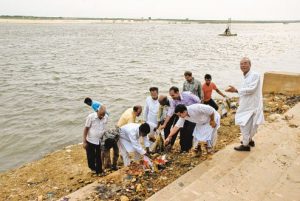Cleanliness is important for prosperity. Finland, Iceland, Sweden, Denmark, Slovenia, Spain, Malta, France are some countries which are ranked as cleanest countries in the world. India won its freedom struggle in 1947, and the main leader of Indian independence struggle Mahatma Gandhi said “Sanitation is more important than independence”. He made hygiene and sanitation an essential part of the Gandhian way of living. He wanted total sanitation for all in India because he strongly believed that cleanliness is most important for physical and mental well-being and a healthy environment. It has bearing on public and personal hygiene.
Though we are taught to inculcate certain habits like washing hands before meals, regular brushing of teeth, and bathing and wearing clean clothes from our young age, in most households, cleanliness of public places is not inculcated in the minds of children. Cleanliness needs to be imbibed in our characters, no wonder our public places and societies are kept filthily.
Gandhiji dwelt on cleanliness and good habits and pointed out its close relationship to good health. No one should spit or blow his nose on the streets. In some cases the sputum is so harmful that the germs infect others. In most developing and progressive countries spitting on the road, throwing trash on the roads, cleaning nose on the road is a criminal offence. Those who spit after chewing betel leaves and tobacco have no consideration for the feelings of others. Spittle, throwing mucus from the nose, etc, is such an ugly thing that we are least bothered about it. India is blessed with beautiful heritage tourist destinations, instead of keeping them clean and tidy and help flourishing tourism, they are neglected and kept dirty.
betel leaves and tobacco have no consideration for the feelings of others. Spittle, throwing mucus from the nose, etc, is such an ugly thing that we are least bothered about it. India is blessed with beautiful heritage tourist destinations, instead of keeping them clean and tidy and help flourishing tourism, they are neglected and kept dirty.
Swachh Bharat Abhiyan (SBA) or Swachh Bharat Mission (SBM) is a nation-wide campaign in India by the present Government from 2014 to 2019 that aims to clean up the streets, roads and infrastructure of Indian cities, towns, and rural areas. The objectives of Swachh Bharat include eliminating open defecation through the construction of household-owned and community-owned toilets and establishing a systematic mechanism of monitoring toilet use. The mission is run by the Government of India; the mission aims to achieve an “open-defecation free” (ODF) India by 2 October 2019, the 150th anniversary of the birth of Mahatma Gandhi.
The mission aims at constructing 90 million toilets in rural India at a projected cost of 1.96 lakh crore (US$30 billion). The mission will also contribute to India reaching sustainable development growth (SDG), established by the UN in 2015. The campaign was officially launched on 2 October 2014 at Rajghat, New Delhi, by Prime Minister Narendra Modi. It is India’s largest cleanliness drive till date.
A clean place instantly looks attractive. Cleanliness raises an ordinary looking place to the extraordinary. Abroad the heritage sites are kept so clean, neat and tidy, they therefore look appealing to visit by foreigners. Imagine how Niagara Falls would look if there were plastic bags, bottles or other waste material all around? In India, Prime Minister Narendra Modi took a vow in 2014 that he would clean up river Ganga by 2019 in five years tenure of his government. A detectably clean Ganga could boost Modi’s credibility as someone who can be trusted to deliver. But, the river is yet to be cleaned. It’s not an easy task, accepted, but in past four years hardly any work has been done on the cleaning it. Among the Hindus in India, the river Ganges is considered sacred and is personified as the Goddess Gaṅgā. She is worshiped by Hindus who believe that bathing in the river causes the remission of sins and facilitates liberation.
The aesthetics of a place raises when it is kept clean and neat. Cleanliness is a character trait, it cannot be forcefully taught. Keeping your environment clean goes a great way in keeping you and your family healthy. It provides enough inspiration to start making a few changes for a cleaner surrounding, cleaner city and cleaner nation. Garbage that is not attended to, garbage lying on the road or in uncovered bins serves as perfect breeding grounds for pathogens and germs. Why allow germs to form? Why allow them to exist in the first place? Why can’t we close the Pandora box of waste? It will reduce the spread of all transmissible diseases.
Tourists prefer visiting destinations which are kept cleaner, where the possibility of acquiring diseases is minimal. It is a very sensible thought. Nobody would want to spend their vacation lying in bed. Hence keeping a place clean will easily lure more tourists and make tourism a booming industry. Like in the cities like Indore, Bhopal and Chandigarh which are supposed to be the cleanest cities in India, the tourism is on boom. Statistics show that these cities attract a large number of travelers every year.
If citizens don’t feel the necessity of cleanliness, the Swach Bharat Movement will be hardly constructive. It is difficult and almost impossible to clean and set everything in a managed way in short time. Waste manage is a real big task. India must gear up technologically for the challenge of waste management.













































